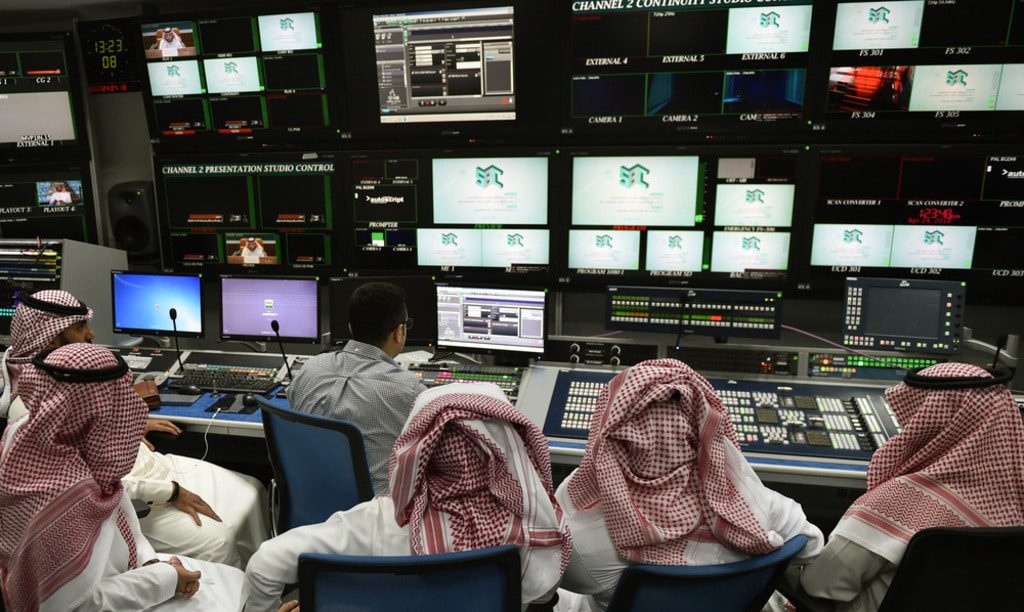
Saudi Arabia’s quest for media control began in earnest after the Iraqi invasion of Kuwait in 1991. Back then, the kingdom was trying to keep its citizens from finding out about the war, although it could not stop people from tuning into CNN.
The same year, the privately owned Middle East Broadcasting Center (MBC) was established. The network has always toed the line of the Saudi government, as do the pan-Arab Saudi-owned newspapers Sharq al-Awsat and al-Hayat.
Yet the emergence in 1996 of the Qatari-sponsored network al-Jazeera, which angered Arab regimes for exposing their corruption and brutality, outdid Saudi attempts for media influence. But rather than adopt liberal reforms or lessen repression, the government has clamped down even harder on free expression.
During the Arab Spring, which threatened to depose the ruling family as it had in Tunisia, Egypt and Libya, the House of Saud amended the country’s media laws. Any newspaper that criticized a state-backed cleric or referenced the discrimination of Saudi Shiites would be fined or closed down. At the time, Shiites in the eastern province of Qatif were demonstrating against the House of Saud and calling for democracy and reforms.
Saudi’s Crown Prince Mohammed bin Salman (often referred to as MBS), who ascended to power in June 2017, further tried to shut down al-Jazeera by imposing a blockade on Qatar.
David Hearst, editor of the online news portal Middle East Eye, said that one of the main reasons Saudi Arabia blockaded Qatar was because it could not buy al-Jazeera or pressure Qatar’s emir to curb his criticism of Arab regimes.
“Saudi Arabia thinks that the media can be bought. That’s the classic Arab state way of thinking about the media. They don’t think the Arab world – and they’ve said so – is ready for free speech and they want to control it,” Hearst told al-Jazeera. Middle East Eye is among the media Saudi Arabia and its allies want closed.
MBS’ next move was to seize the media assets of Saudi tycoons, even though they have never dared to criticize the ruling family.
The crackdown, which was presented as an anti-corruption probe, took place in November 2017, when MBS ordered the arrest of dozens of royals, senior officials and wealthy businessmen. Many of those arrested eventually negotiated their release by relinquishing their assets. The most prominent of the detainees was Waleed al-Ibrahim, chairman of MBC, which remains one of the most influential private networks in the Arab world.
One source at MBC told Reuters that the government had attempted to buy the media company two years ago, but al-Ibrahim believed that the proposed price was too low. The source said that the government has now acquired the network for free.
Billionaire Prince Al-Waleed bin Talal was also forced to hand over his assets, including the network Rotana. Saleh Kamel, who owns the less influential Arab Radio and Television Network, also relinquished his shares in that company.
“The prospect of bringing the giants of Saudi and Arab media under unified government control is worrying. It raises concern that the diversity of opinion and coverage will be further curtailed. Mohammed bin Salman is clearly intent on controlling the message as he conducts a dramatic restructuring of the Saudi state and economy,” Kristin Diwan, senior resident scholar at the Arab Gulf States Institute in Washington, told the Financial Times.
Hugh Miles, author of Al-Jazeera: How Arab TV News Challenged the World, said that Saudi Arabia’s quest for media domination is a way to exert its soft power in the region. Most Saudi-owned channels, he stressed, do not make a profit, indicating the political motivations behind the government’s interest in purchasing or seizing influential media outlets.
“A channel is a very economical way to influence people. Bang for your buck, it’s much cheaper than guns. It is about controlling the discourse, and for Saudis about being in charge,” Miles told the Center for Security Studies, which published a 2018 report on Saudi Arabia’s media dominance.
The report also stated that Saudi Arabia’s takeover of the media is negatively impacting journalistic ethics, where balanced coverage, nuance and investigative reporting are absent. Instead, Saudi Arabia’s enemies, such as Iran and its allies, tend to be demonized, while criticism of the kingdom is mute.
More concerning, Saudi Arabia has often tried to bribe or co-opt foreign journalists to portray a positive image of the ruling family. In an undated cable from WikiLeaks, the Saudi embassy in Berlin proposed hiring German journalists to write propaganda articles that endorsed the kingdom. The journalists would have been paid 7,500 euros for writing articles and translating books from Arabic to German, with the purpose of handing them out at cultural events.
Worse still, journalists who refuse to fulfil Saudi Arabia’s public relations duties are often smeared or threatened. Another undated WikiLeak revealed that a reporter for the Financial Times had to leave Riyadh for publishing what the Saudi state deemed lies. The House of Saud, according to the leak, even considered taking legal action against the paper and journalist for criticizing the government and elite officials.
In an article for The New Arab website, James Dorsey, a Middle East expert, wrote that the only space that has not been bought or seized by MBS is social media. After the crown prince announced his Vision 2030, which he is undertaking to reduce the kingdom’s dependency on oil, there was much debate on social media about whether the vision is achievable.
There is less debate now. Anyone who dares to criticize MBS’ policies risks arrest, as was evident when several public personalities – including activists, journalists and religious clerics – were seized in an earlier round-up in September 2017. Crackdowns on dissent along with MBS’ media grab, wrote Dorsey, has escalated a media war with Qatar that has little to do with journalism.


